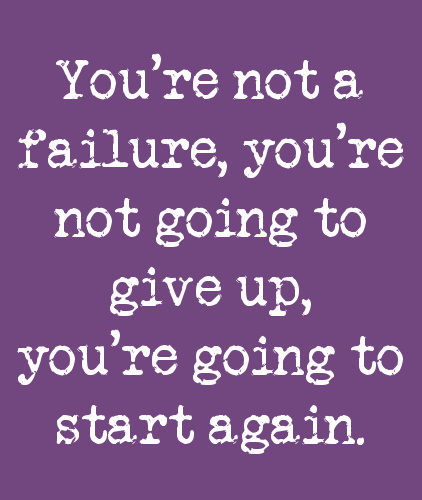Mindset Tool #6 – Expect to Fail
This month, we’re talking about tools you can use to make healthy changes in your life, especially changes you find hard to make. Yesterday we talked about how to focus on action and not wait around for inspiration.
Today, I want to encourage you to expect to fail.

Say what now?
We’ve been talking for the past few weeks tools you can use to make healthy, positive changes, and I’ve been encouraging you to really press ahead and go for it – to decide what kind of woman you want to be, to decide that you are worth it, and then to work on becoming that woman.
And now I’m telling you to expect to fail?
Correct.
Of course, I’m not saying that you’re going to fail in your goal of becoming stronger, eating healthier, creating a happier marriage, starting a business, or pursing any other healthy or positive goal. In fact, I have every confidence that you’re going to succeed in making the changes you’ve set out to make.
What I am saying is that you’re going to fail along the way. So expect to fail. More than once. In fact, lots of times. You’re going to fail, and so am I.
Why? Because change is hard. And positive, meaningful, good-for-you change is often very hard. It requires making a series of changes consistently, over a significant period of time.
Which means that sometimes you’ll fail. You’ll mess up, you’ll get off track, you’ll want to throw in the towel.
You’ll encounter intense resistance that will lead you down the wrong path. In other words, you’ll fail.
But you know what? Failure is normal, it’s expected, and it’s not something to fear (nobody likes it, but you don’t have to fear it). In fact, you should expect to fail.
So what does failure look like when you’re working on making healthy or positive changes in your life? It can take 1,000 different forms, which might include:
- Eating a bunch of food that you really don’t want to eat.
- Watching TV instead of exercising.
- Wasting time on social media instead of working on your blog or your Etsy shop.
- Letting fear stop you from trying something new.
- Putting off doing the thing you really need to do.
- Falling back into old patterns in your marriage.
- Staying up late when you’ve committed to getting more sleep.
We’ve all done those kinds of things, and you know how they make you feel – mad at yourself, frustrated, even disgusted. In other words, you feel like a failure.
But failing to do something that you really want to do, that you know is healthy and positive for you, doesn’t mean that you’re a failure.
It means you’re normal.
Every woman who has ever achieved anything significant – getting fit, switching to a healthy diet, reaching a healthy weight, establishing healthy boundaries in her life, creating a business, starting a ministry – has failed. More than once. In fact, many times.
The key is that those women didn’t decide that they were “failures.” Instead, they picked themselves up, tried again, tested a new strategy, or even started over.
In fact, that’s the pattern for success in any important endeavor – struggle, fail, start again, persist, do it all over again and again, and – finally – succeed.
And as you go through this pattern, you learn things you never would have learned any other way.
I’ve learned, for example, that I have to exercise as soon as I get home from work – not an hour later, not even 30 minutes later. If I don’t, I’ll fail to stick with my goal of moving my body every day in ways that make it healthier and stronger.
If I don’t get any exercise today because I didn’t exercise right after work, I’m not a failure – it just means that I haven’t taken a step that I know is effective. And not taking that step keeps me from reaching a goal that’s important to me. But – and this is the important part – it’s something I can fix.
I’ve also learned that I use social media as a way to distract myself when I need to work on things that scare or challenge me. If I start scrolling through Facebook or Instagram when I really want to be writing an article or working on an ebook, I’ll probably fail to work on my goal that day – but I won’t be a failure. (Although I might feel like one…)
So l want to encourage you to re-frame failure and put it to work for you. First, treat it as a verb, not a noun. You “failed” on a particular occasion (or, even better, you didn’t yet succeed) but you aren’t a “failure.” You didn’t do something you wanted or planned to do – and it feels like failing, but you’re not a failure.

Second, practice changing the verb. Instead of “failing,” think of it as “learning,” “figuring things out,” or “getting smarter:”
- You learned that not making a meal plan and doing some food prep on the weekend means that you won’t eat healthy meals that week.
- You figured out that watching TV before you exercise means that you’re not likely to exercise.
- You learned that opening Facebook or Instagram before you’ve worked on an important project means that you won’t work on it that day.
- You got smarter and realized that messing around on your phone or tablet in bed means that you won’t sleep well.
And third, forgive yourself and take the next step toward your goal. Listen, we’ve established that we’re all going to mess up, get off track, and do things that seem an awful lot like failure. Maybe you’re experiencing that right now. Maybe your healthy eating or exercise plan is off track. Maybe you haven’t done anything to work on that ministry you plan to start this year. Maybe your writing project consists of two paragraphs – or a blank page. Maybe your plans to connect with your spouse at a deeper level have gone nowhere.
That’s fine – it means that you’re normal. Give yourself a break. You’re not a failure, you’re not going to give up, you’re going to start again.
In other words, you’re going to expect to fail and learn to work through it, using those three simple steps – treat it as a verb, practice changing the verb, and forgive yourself and take the next step.

Use the Tool – Today or tomorrow, identify something you’re doing that makes you feel like a failure, something related to one of your important goals or plans for the year. Then work through the 3 steps and use them to make your plan for doing things differently – in a way that moves you forward on that goals or plan. And download this picture and save it where you’ll see it when you need a reminder.
I’d love to know how you’re re-framing failure. Leave a note in the Comments, or email me at hello @ healthylifetoolbox.com.
You can find all of the tools in the Healthy Life Toolbox here.







